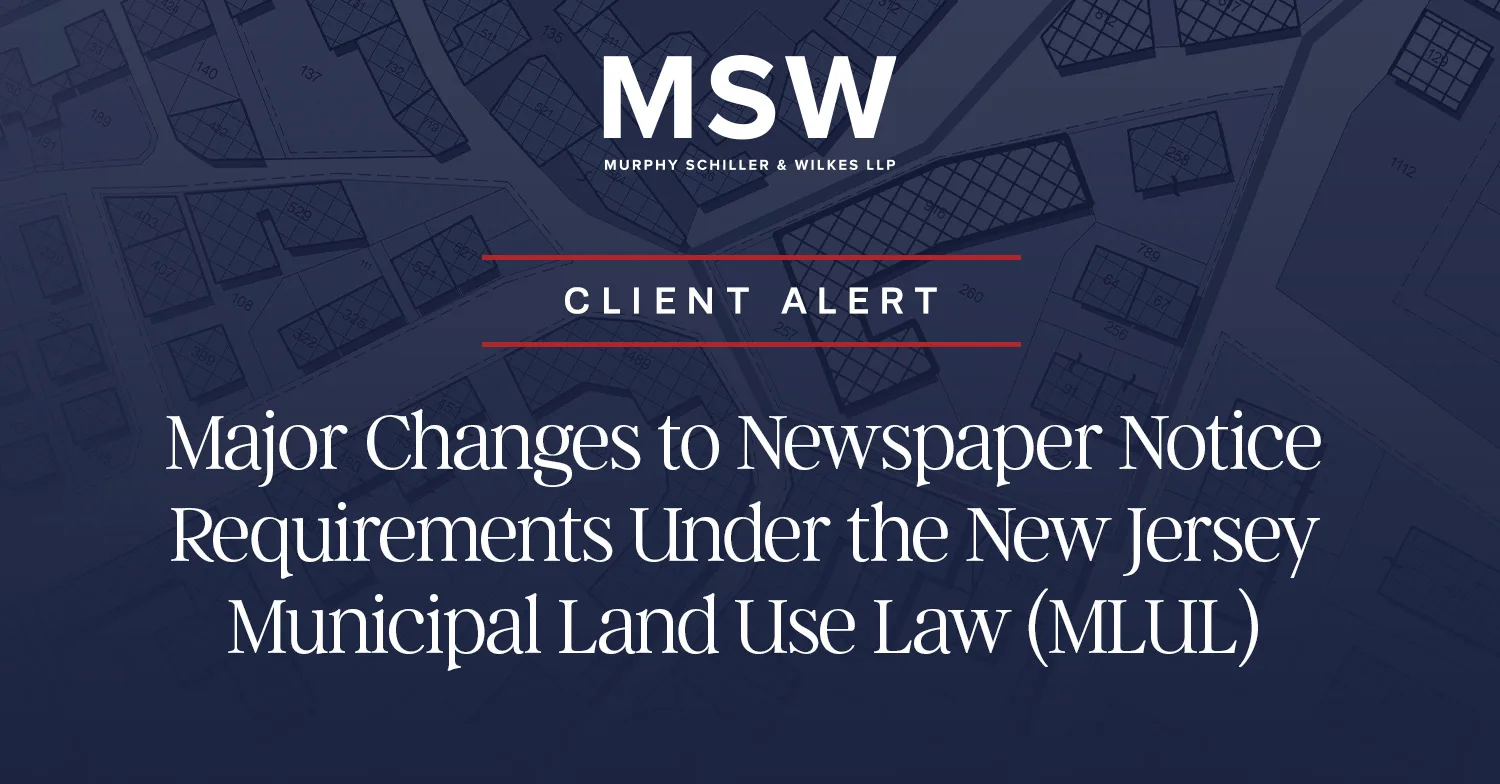
The New Jersey Municipal Land Use Law (MLUL) has long established strict procedural requirements for providing public notice of land use applications. Under the current law, applicants seeking approvals for development, variances, or other land use actions must provide notice in two primary ways:
- Certified Mail to Property Owners: Notice must be sent by certified mail to all property owners within 200 feet of the subject property. This ensures that those most directly affected by a proposed development are informed and have an opportunity to participate in the public process.
- Newspaper Publication: Notice must also be published in an official newspaper of general circulation in the municipality at least 10 days prior to the scheduled public hearing. This requirement is designed to provide broader public awareness and transparency regarding pending land use matters.
These notice requirements are foundational to the MLUL’s commitment to public participation and due process in local land use decision-making.
New Legislation: Modernizing Legal Notice Publication
A newly enacted bill—S4654/A5878—recently passed with overwhelming support in both the Senate and Assembly and expected to be signed by Governor Murphy, brings significant changes to the way legal notices, including those required under the MLUL, must be published. The legislation, effective March 1, 2026, modernizes the notice process by shifting the focus from traditional print newspapers to digital platforms. Key provisions include:
- Mandatory Online Publication: After March 1, 2026, public entities (including municipal land use boards) required by law to publish legal notices must do so on their official government websites. The website must be accessible to the public free of charge, and a direct hyperlink to legal notices must be prominently displayed on the homepage.
- Centralized State Portal: The Secretary of State will establish a centralized online portal that aggregates hyperlinks to the legal notice pages of all public entities. This portal will also be freely accessible to the public.
- Archiving Requirements: Legal notices must remain on the public entity’s website for at least one week (or longer, if required by law) before being transferred to an online archive, which must be maintained for at least one year.
- Optional Use of Online News Publications: Local government units may, in addition to their own websites, publish legal notices in eligible online news publications that meet specific criteria for accessibility, searchability, and local reach.
- Transitional Period: Until March 1, 2026, municipalities may continue to use print or electronic newspapers for legal notices, as previously permitted.
Implications for Land Use Applicants and Municipal Authorities
These changes represent a fundamental shift in how public notice is provided for land use applications:
- Increased Accessibility and Transparency: By requiring publication on official government websites and a centralized state portal, the new law aims to make legal notices more accessible to the public, eliminating paywalls and subscription barriers often associated with traditional newspapers.
- Potential for Broader Public Awareness: Online publication may reach a wider audience, including those who do not regularly read print newspapers but have internet access.
- Changes in Compliance Procedures: Applicants and municipal authorities must adapt their notice procedures to ensure compliance with the new online publication requirements. This includes understanding the technical aspects of posting notices, maintaining archives, and ensuring that notices are posted for the required duration.
- Continued Certified Mail Requirement: The new law does not alter the requirement to provide notice by certified mail to property owners within 200 feet. This remains a critical component of the MLUL notice process.
- Legal Sufficiency and Risk Mitigation: The law provides that publication of legal notices on a public entity’s website or an eligible online news publication, in accordance with the new requirements, satisfies the legal obligation for notice. It also includes protections against defects in notice due to technical errors or outages beyond the control of the public entity or applicant.
Recommended Actions and Considerations
Given the significant changes to the legal notice landscape, we recommend the following actions for clients and stakeholders involved in land use matters:
- Stay Informed and Plan Ahead: Applicants and municipal officials should familiarize themselves with the new requirements and begin planning for the transition to online notice publication. This may involve updating internal procedures, training staff, and coordinating with IT departments.
- Monitor Implementation Timelines: The new requirements become mandatory on March 1, 2026. Until then, existing newspaper notice practices remain valid, but early adoption of online notice procedures may ease the transition.
- Verify Website Accessibility: Municipalities should ensure their official websites are capable of hosting legal notices in a manner that is easily accessible, searchable, and compliant with the new law’s requirements.
- Consult Legal Counsel: Given the potential for procedural challenges and the importance of proper notice in land use approvals, applicants and municipal authorities should consult with legal counsel to ensure full compliance and to address any questions regarding the new procedures.
- Document Compliance: Maintain thorough records of all notice publications, including screenshots, posting dates, and archive logs, to demonstrate compliance in the event of a legal challenge.
The modernization of legal notice requirements under the MLUL reflects a broader trend toward digital government and public transparency. While these changes promise greater accessibility and efficiency, they also require careful attention to new procedures and compliance standards. As a leader in New Jersey land use and zoning law, MSW is available to assist clients in navigating these changes and ensuring that all land use applications and approvals are properly noticed under the new law.
Murphy Schiller & Wilkes LLP (MSW) is a boutique law firm servicing the commercial real estate and construction industries. Headquartered in Newark, New Jersey, the firm represents a wide range of clients, including institutional, publicly traded real estate companies, international and regional lenders, national contractors and subcontractors, and family offices. The firm has been ranked as a top law firm by both Chambers & Partners and U.S. News & World Report.